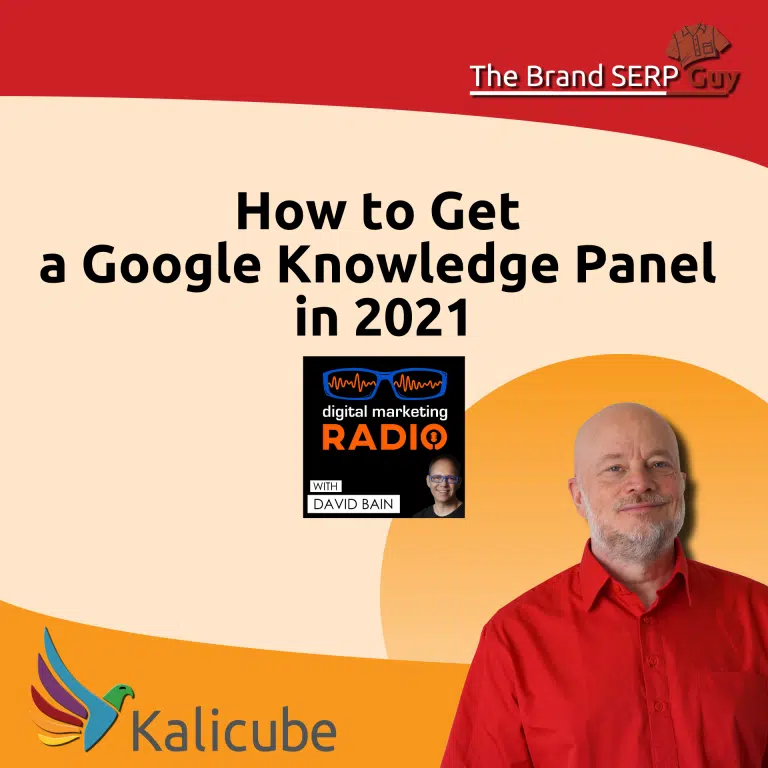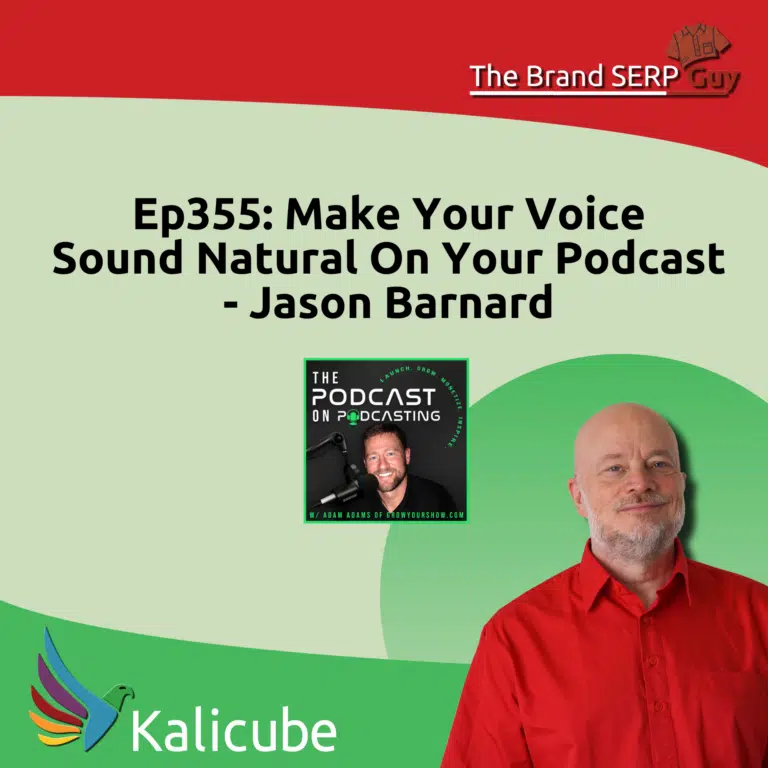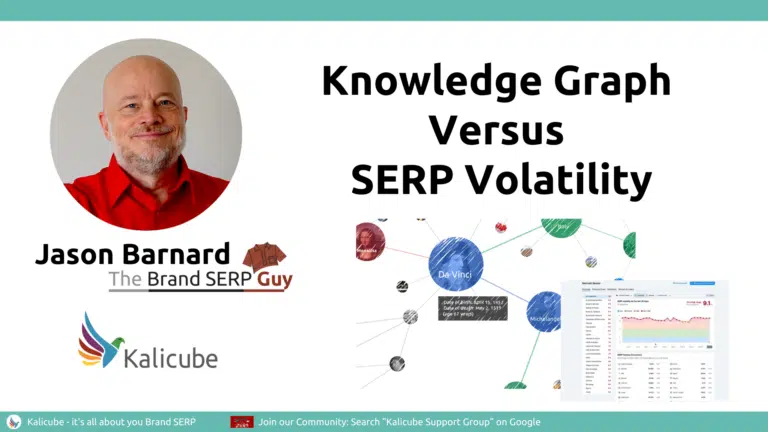The Knowledge Panel is a summary of the information behind the search results that Google feels confident are factually accurate and helpful to the user.
Brand Knowledge Panels are Google’s understanding of the facts about the brand as an entity. It’s a summary of what it’s understood.
By following the three steps outlined in this presentation, you can take control of your Knowledge Panel and ensure that it is accurate and up-to-date. This will help you to improve your online visibility and reach more potential customers:
1. Establish an Entity Home
2. Accumulation of Corroboration
3. Linking Back to Your Entity Home to Create a Self Confirming Loop
Generative AI in search and Bing Chat are simply dynamic Knowledge Panels.
The key to control and the key to managing how these machines understand and represent you is the Entity Home.
According to Jason Barnard (The Brand SERP Guy): If Your Knowledge Panel Isn’t Part of Your Digital Marketing Strategy, You’re Doing It Wrong
[00:00:00] The Brand SERP Guy (Jason Barnard): Hi, I’m Jason Barnard from Kalicube. I’m going to explain to you today why if your Knowledge Panel isn’t part of your digital marketing strategy, you are doing it wrong. So, off we go. First, I’ll introduce myself, Jason Barnard, The Brand SERP Guy. This is a Brand SERP. It’s the search result for a personal name or a company name.
[00:00:22] The Brand SERP Guy (Jason Barnard): Today, I think I’ll call myself The Knowledge Panel Guy because that’s what we’re focusing on. And indeed, John Mueller from Google calls me Mr. Knowledge Panel because, as he says, outside of Google, I know more about this than anybody else.
Introducing Jason Barnard (The Brand SERP Guy) Through His Brand SERP and His Company, Kalicube
[00:00:38] The Brand SERP Guy (Jason Barnard): So, back to the Brand SERP. My Brand SERP will show my entire story. Currently living in Paris, as you can see from the LinkedIn profile. I was a voice actor, a cartoon blue dog, as you can see from the songs and the IMDb entry. I was a punk folk musician back in the nineties, The Barking Dogs, down there in the right hand corner. I have a groovy podcast, which is intelligent, interesting, and fun. And I’m an author both on these journals, Search Engine Journal, Search Engine Land, and the book, The Fundamentals of Brand SERPs for Business.
[00:01:12] The Brand SERP Guy (Jason Barnard): And I’m also the CEO and founder of Kalicube, and our motto is take control of your brand narrative online and dominate the competition. And that is what we’ve been doing for the last 10 years. So, The Brand SERP Guy, Kalicube, we specialise in your brand name, your brand narrative across search, starting with the search result for your exact match brand name.
A Background of the Topics in This Presentation Related to Kalicube’s Approach, Knowledge Panels, and Generative AI
[00:01:38] The Brand SERP Guy (Jason Barnard): So, the plan today. I’m going to talk to you about Kalicube’s approach to the SERP, facts and recommendations, what is a Knowledge Panel, the role of a Knowledge Panel in search, Brand Knowledge Panels are special, the three step process, how to trigger and manage Knowledge Panels, the industry solution to generative AI in search, why Knowledge Panels are the key to the future of digital marketing, which is the exciting part of this presentation, and the ultimate aim for any business including yours.
[00:02:12] The Brand SERP Guy (Jason Barnard): So, Kalicube’s approach to the SERP. It worked yesterday, it works today, and it already works for tomorrow. I’ve been in SEO for 25 years, since 1998, and I’ve used this approach through the entire time. I’ve been working on search, facts and recommendations, as we see here.
The Left Hand Side of a Brand SERP as Recommendations and the Right Hand Side as Facts
[00:02:32] The Brand SERP Guy (Jason Barnard): On the desktop over there on the left hand side, you can see Kalicube’s Brand SERP. On the right hand side, you can see what it looks like on mobile. The mobile version is incredibly confusing to deal with and to analyse. So, what I’m going to do is focus on the desktop version. That’s what we do at Kalicube, simply because it’s easier to explain.
[00:02:53] The Brand SERP Guy (Jason Barnard): And this is a great example of it being easier to explain. On the left hand side in green, we have recommendations. Now, on a Brand SERP, it’s the recommendations of which content online Google feels is helpful, valuable, and relevant for your audience. It’s the recommendations Google is giving your audience about how they might want to engage and interact with you.
[00:03:18] The Brand SERP Guy (Jason Barnard): On the right hand side, it’s showing us the facts that it’s understood about the brand, the Knowledge Panel, the fact it has understood about the brand, and now the foundation of any SEO strategy, and as we will see, any answer engine, assistive engine, and indeed any digital marketing strategy moving forwards.
The Kalicube Process: Educating AI Algorithms Such as Bingbot, Googlebot, and Applebot
[00:03:39] The Brand SERP Guy (Jason Barnard): Now, the Kalicube Process is a term we use for the way that we educate the AI algorithms, and we like to say we educate them like they are children. They are children thirsty for knowledge. You can see Bingbot over there on the right hand side, Googlebot in the middle, Applebot on the left hand side, and Kalibot as the teacher.
[00:04:03] The Brand SERP Guy (Jason Barnard): Now, we want to educate them about the facts. And as you can see, Bing Chat has understood what the Kalicube Process is. And it’s getting the information from us, but it also understands what the benefits of each option are. We’ve educated it not only about what the Kalicube process is, but how it benefits brands to use this process.
[00:04:28] The Brand SERP Guy (Jason Barnard): All of it, once again, comes from us. And at the bottom, you can see the different questions that it’s suggesting the user might want to ask to continue their journey with us. How do I access the free resources? Where can I buy the book? And how do I enroll in the Kalicube Academy? And you can clearly see there that Bing is taking the user down the funnel towards purchase.
The Future of Generative AI in Google Search Is Good News for Kalicube
[00:04:54] The Brand SERP Guy (Jason Barnard): Now, Google just announced generative AI in search. They’re carefully not calling it Bard, and this is what it looks like. And I did a screen capture and sat and thought about this for a while, and it’s hugely good news for Kalicube. And we’ll see why in a moment.
[00:05:13] The Brand SERP Guy (Jason Barnard): And I think some of you are probably already way ahead of me in terms of what I’m going to be saying. When I talk about the fact that this title of this presentation is Knowledge Panels and why they are key. And when you look at this and you know a lot about Knowledge Panels, it becomes fairly obvious what I’m going to say next.
What Is a Knowledge Panel and What Is Its Purpose?
[00:05:32] The Brand SERP Guy (Jason Barnard): So, back to the simplistic question. What is a Knowledge Panel? Knowledge Panel, facts on the right hand side, in the right rail of the SERP on desktop. There are many formats, and I think this is something a lot of people miss. Different formats depending on the type of entity, the type of information, the confidence in the information Google has, and what it feels is going to be, once again, helpful to the user searching the brand name.
[00:06:00] The Brand SERP Guy (Jason Barnard): Now, what’s its purpose? A quick clue is it’s a time saver. It’s a summary of the information behind the search results that Google feels confident are factually accurate and helpful to the user. And that’s exactly what Bing Chat does. It searches Bing results, pulls the results up, summarises them, and creates what I would call a dynamic Knowledge Panel to show the user just the answer they need. So, Bing Chat and Google’s generative AI are simply dynamic Knowledge Panels.
Brand Knowledge Panels: Google’s Understanding of the Facts About the Brand as an Entity
[00:06:44] The Brand SERP Guy (Jason Barnard): Now, Brand Knowledge Panels are Google’s understanding of the facts about the brand as an entity. It’s a summary of what it’s understood. And as you can see here on the left hand side, more understanding, on the right hand side, less understanding. Meta incredibly well understood. Kalicube very well understood. WordLift slightly less well understood. Kalicube Pro slightly less again.
[00:07:09] The Brand SERP Guy (Jason Barnard): And Perceptive Fittings Limited, very little understanding, just the name of the company. But even that one right there on the right hand side, it’s the least understanding of these. But compared to most brands, at least 50% of brands do not have a Knowledge Panel. So, Perceptive Fittings Limited are already doing better than most brands.
Triggering, Managing, and Optimising Knowledge Panels: The First Step Is to Establish an Entity Home
[00:07:33] The Brand SERP Guy (Jason Barnard): Here’s the part that I think you’ve been waiting for is what can you do. What can you do to trigger and to manage and to optimise a Knowledge Panel, and feed these AI algorithms like their children with the fact about your brand, your products, your offers?
[00:07:51] The Brand SERP Guy (Jason Barnard): There are three steps to take control. Every entity needs a home, the go-to place for information that Google trusts about that brand. John Mueller calls the process reconciliation. What John Mueller is saying is that the web is a mess, and Google is struggling to make sense of that mess and be confident in its understanding.
The word confident is hugely important here. Understanding is one thing, confidence in understanding is another.
Jason Barnard (The Brand SERP Guy)
[00:08:18] The Brand SERP Guy (Jason Barnard): The word confident is hugely important here. Understanding is one thing, confidence in understanding is another. And if we think about the child, its confidence in its understanding is hugely, hugely, hugely important. It won’t show information unless it’s confident that information is true.
The Entity Home Is Also Called the Point of Reconciliation, Where the Entity Gives Their Version of the Facts to Google
[00:08:35] The Brand SERP Guy (Jason Barnard): The point of reconciliation, we call it the Entity Home, is where the brand, the entity, the person gives their version of the facts to Google. And Google then takes that version and reconciliates all the other different versions around the web using that as its reference point. So, it’s looking for your story, your version of the facts from you.
[00:09:00] The Brand SERP Guy (Jason Barnard): The Entity Home is shown in the Knowledge Panel with the little world icon. And you can see here my music group, The Barking Dogs, has an Entity Home on my own website, which indicates as well that the Entity Home can be on your own website. But potentially, the Entity Home could be on somebody else’s website. And that’s something you don’t want. You want to take control.
Having an About Page as Your Entity Home Is Much More Sensible Than Using Your Homepage
[00:09:24] The Brand SERP Guy (Jason Barnard): So, it’s a page on a website that you control, where you describe clearly who you are and what you do. That means the About Page is ideal. Since if you put the Entity Home on the homepage, which is the one naturally Google will go for because of the number of links to it, you’ll struggle to separate the message to your users, who you’re trying to sell to, from the factual message you want to give to Google.
[00:09:52] The Brand SERP Guy (Jason Barnard): So, having an About Page dedicated as the Entity Home is much, much more sensible, because there you can explain the facts, and you can set them out in a way that makes sense to Google. That doesn’t mean that it doesn’t have to be attractive to users, but you use it as a way to communicate the facts, your version of the facts to Google over time. And it will be the place that Google will come back to time and time and time again to double check what you want it to understand about your brand, who you are, what you do, and which audience you serve.
The Next Steps: Accumulation of Corroboration and Linking Back to Your Entity Home to Create a Self Confirming Loop
[00:10:29] The Brand SERP Guy (Jason Barnard): From that Entity Home, you need to sign post multiple independent, authoritative third parties that corroborate what it is you’re saying. We call that accumulation of corroboration, multiple sources that corroborate what it is you are saying, the fact about your entity, who you are, what you do, which audience you serve.
[00:10:55] The Brand SERP Guy (Jason Barnard): And preferably, they will link back to your Entity Home. And you create an infinite self confirming loop of corroboration, where Google goes to the Entity Home, reads the facts, you point it to another source such as Crunchbase, it sees the same version of the facts, or a very close version of the facts, no contradictions on that website, and that website then points back to the Entity Home.
Google is a child. It learns from pure repetition.
Jason Barnard (The Brand SERP Guy)
[00:11:21] The Brand SERP Guy (Jason Barnard): It goes from the Entity Home out to another website, for example Wikidata, and sees the same facts again, and it comes back from Wikidata to the official site, which is your own website, the About Page, the Entity Home, and then goes out to Google Books perhaps and sees the same information, comes back to the Entity Home, and so on, and so on, and so on, and so on. Google is a child. It learns from pure repetition.
The Importance of Having Your Entity Home as a Reference About You, Which Is Also Important for Feeding Generative AI
[00:11:50] The Brand SERP Guy (Jason Barnard): And you want to make your page the reference for you. And the ultimate sign that you’ve managed to do that is that not only do you have the Entity Home as a world icon in your Knowledge Panel, but you also have the description being pulled from the Entity Home itself, which means you control the brand narrative when Google is presenting the facts about you.
[00:12:12] The Brand SERP Guy (Jason Barnard): And when we think about generative AI in search and Bing Chat, that’s hugely important that it believes you and that you can feed it with information about you, your offers, and the audience you serve.
Some Statistical Figures About Knowledge Panels, Their Main Sources of Information, and How Kalicube Can Control It
[00:12:26] The Brand SERP Guy (Jason Barnard): Importantly, for that description, 4 out of 10 Knowledge Panels do not cite Wikipedia. 3 out of 10 don’t cite anybody. 1 out of 10 cite a non-Wiki source. And 1 out of 101%, only 1% cite the brand’s own brand narrative, brand story from their Entity Home. 1% is tiny, and it isn’t that difficult to do. As you can see, these two companies have done it. Kalicube has done it in the past. It doesn’t always stick, but we’re going to get that back.
[00:13:01] The Brand SERP Guy (Jason Barnard): And with a solid Entity Home, you can feed the Knowledge Graph. As you can see here with the Entity Home on jasonbarnard.com, which is why I used that as an example earlier on, I could change the information in the Knowledge Panel in 8 minutes. That’s a huge amount of control. It’s a huge amount of control over the facts that these engines have understood and will represent to the subset of its users, who are your audience.
Generative AI in Search and Why Knowledge Panels Are the Key
[00:13:33] The Brand SERP Guy (Jason Barnard): Now, the huge point is generative AI in search and why Knowledge Panels are the key. Here you can see, from the screenshot of Google’s presentation last week in May 2023, that there are similarities between Knowledge Panels and the panel that the generative AI is showing, including the Knowledge Panel cards represented over there on the right by generative AI cards, the description about the Entity, and then the additional questions on the left hand side, personality, wife question, and on the right hand side, ask a follow up, how long to spend at Bryce Canyon with kids, and so on and so forth.
[00:14:20] The Brand SERP Guy (Jason Barnard): So, those suggested questions are already represented in Google’s Knowledge Panel. You can now see why I believe Knowledge Panels are the future in terms of controlling and managing generative AI in Google and Bing Chat. And when you look at this, it becomes even more obvious.
Generative AI and the Chat Functionality as Part of Bringing the User to the Ultimate Solution to Their Problem.
[00:14:40] The Brand SERP Guy (Jason Barnard): Bing have got the filter pills. They’ve got the description. They’ve got the attributes. They’ve got the questions. They’ve got the People Also Search For. This rich Bing result on the right hand side, including the generative AI description at the top on the right, is very much the future where search generative AI chat answer engines, if you prefer, will be combined.
[00:15:08] The Brand SERP Guy (Jason Barnard): Google has said, and indeed Bing has said as well, that search remains the jumping off point. The generative AI and the chat functionality is part of bringing the user down the funnel to the ultimate solution to their problem.
Control Is the Ultimate Aim and the Key to Control Is the Entity Home
[00:15:27] The Brand SERP Guy (Jason Barnard): And control is the ultimate aim for you too. You want to control how these engines bring the subset of their users, who are your audience, down the funnel to ultimately do business with you. And you want to maximise the number of times they cite your brand and they recommend your brand to their users as they come down the funnel.
[00:15:50] The Brand SERP Guy (Jason Barnard): And remember, I said earlier on, all SERPs are a mixture of facts and recommendations. That mixture between fact and recommendation is going to become increasingly blurred. And that is what we need to deal with. And that’s exactly what we do at Kalicube.
[00:16:07] The Brand SERP Guy (Jason Barnard): And the key to control and the key to managing how these machines understand and represent you is the Entity Home. If you have an Entity Home suddenly anchored in the brain and the algorithms of these machines, then you become the master of how they present your brand. And you vastly increase the probability that they will recommend your brand, simply because they understand it, and they’re confident in that understanding of who you are, what you offer, and who your audience is.
A Summary of All the Things You Would Want to Retain in Your Brain According to Jason Barnard (The Brand SERP Guy)
[00:16:43] The Brand SERP Guy (Jason Barnard): Now, here’s a quick reminder at the end of things that you would want to retain in your brain. SERPs and Chat are built from facts and recommendations. A Knowledge Panel is a summary of search results. Knowledge Panels are increasingly information rich. Brand Knowledge Panels are key to your digital strategy. Managing Knowledge Panels is a three step simple process. And you can easily turn generative AI in search from a threat into an opportunity if you take control.
If your Knowledge Panel is part of your digital marketing strategy, then you’re doing it right.
Jason Barnard (The Brand SERP Guy)
[00:17:19] The Brand SERP Guy (Jason Barnard): With Kalicube, we optimise your brand on search, you’re the best in market, show it across search, take control of your brand narrative online, and dominate the competition. If your Knowledge Panel is part of your digital marketing strategy, then you’re doing it right. Thank you.






